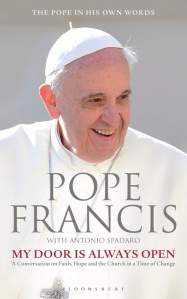 God manifests himself in historical revelation, in history. Time initiates processes, and space crystallises them. God is in history, in the processes under way. We must not focus on occupying the spaces where power is exercised, but rather on starting long-run [long-term] historical processes. This gives priority to actions that give birth to new historical dynamics. And it requires patience, waiting. (Ch III: “Seeking and Finding God in All Things”, p. 96)
God manifests himself in historical revelation, in history. Time initiates processes, and space crystallises them. God is in history, in the processes under way. We must not focus on occupying the spaces where power is exercised, but rather on starting long-run [long-term] historical processes. This gives priority to actions that give birth to new historical dynamics. And it requires patience, waiting. (Ch III: “Seeking and Finding God in All Things”, p. 96)
In last week’s post, I mentioned something that struck me while reading My Door is Always Open, the conversation between Pope Francis and Antonio Spadaro SJ, editor of La Civiltà Cattolica. Namely, this line from page 24:
The Jesuit must be a person whose thought is incomplete, in the sense of open-ended thinking.
This line appealed to me immediately. Partly because I have a tendency to scrupulosity, and find this Ignatian open-mindedness both challenging and deeply therapeutic, so the reminder of it is always welcome. (For a sympathetic but detached perspective on scrupulosity, listen to Fr Thomas Santa on This American Life here.) But mostly because, of all the things I’ve read by and about Francis since his election, this is the single phrase that has cast most light on the way he works. Jorge Mario Bergoglio is not simply a conservative or a radical. He is not a hardline essentialist, nor is he a Po-Mo (Pope-Mo?) relativist. He is a Jesuit, and a Jesuit by his own standards. He is an open-ended thinker.
And this is a conversation primarily about thinking; about approaches rather than actions. Readers looking for a manifesto of reform, or a promise of preservation, will leave disappointed. The primary value of this interview is the opportunity to see inside what Spadaro calls “the Bergoglian vision of the world”: on one hand, the transcendental certainty of redemption, the utter conviction of faith; on the other, the innate limitations of human perception, the impossibility of knowing.
Reading it properly requires several passes, although Spadaro’s commentary goes a long way towards entrenching the cardinal points, and without editorialising too much. The conversation is wide-ranging and touches on a number of topics, including collegiality, the role of women, sexuality and Church doctrine, the history of the Jesuit order and the Pope’s taste in literature. By the time I picked it up, many of the more topical statements had already been singled out for extensive discussion in the media, and had lost their impact. This was no bad thing. It allowed me a much clearer view of the whole, and released me from my usual habit of scrabbling through the Papal interview for signs that Francis and I agree: another kind of scrupulosity.
Bloomsbury, paperback, 224 pp. ISBN: 9781472909763